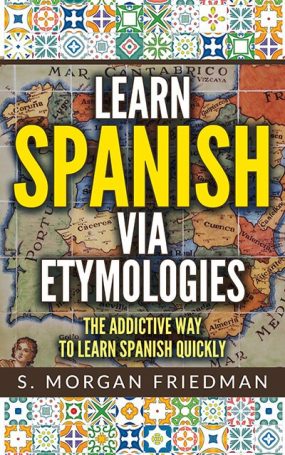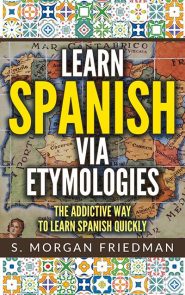Carne and Carnival
- Posted by Morgan
- on Apr 13, 2024
- in True Spanish Etymology Stories
The Spanish carne (“meat”) is surprisingly related to… carnival.
The original carnival — the wild annual February parties in the Roman Catholic countries — were, after all, a meat market in many senses of the word!
Also related, more literally, is the English carnage.
You can see the c-r mapping in both the English and Spanish words clearly.
- See more of this pattern: True Spanish Etymology Stories
Presupuesto and Presuppose
- Posted by Morgan
- on Apr 12, 2024
- in True Spanish Etymology Stories
Today’s pattern is another entry in the “obvious in hindsight” category.
Presupuesto is the common Spanish word for “budget.” Sounds arbitrary and hard to remember.
But it turns out, this is just a participle of presuponer, which is conjugated just like poner and means… to presuppose.
We see the relation between the words obviously in the too-clear pre-s-p-s pattern.
A budget, after all, is just presupposing how all the money will be spent, right?
- See more of this pattern: True Spanish Etymology Stories
Amigo and Friend
- Posted by Morgan
- on Apr 12, 2024
- in True Spanish Etymology Stories
Today’s etymology is simple and to the point — and, for me at least, was completely unexpected:
Amigo (Spanish for “friend”), comes from the Latin amare, “to love,” a common word we see everywhere, as in amor and amante.
So, a “friend” is literally someone you love.
The best part is that there is an exact parallel to English as well: the English friend comes from the Old Germanic word frijojanan meaning… “to love”. From this Germanic root meaning “to love” we get various distantly related words in English, like Friday (the day of Love — just like how in Spanish, viernes is named after Venus, the goddess of love) as well as freedom. Freedom is something we love… just like our friend.
- See more of this pattern: True Spanish Etymology Stories
Rehusar – Refuse
- Posted by Morgan
- on Apr 11, 2024
- in Initial F to H, Patterns
The Spanish rehusar — literally, “refuse” — sounds odd to English ears: it’s the same word, but the -f- became an -h-. Huh?
This is explained via the pattern of Latin words that began with an f- tending to turn into an h- in Spanish and only in Spanish. See famine/hambre, and huir/fugitive for example.
Refuse and Rehusar follow the same pattern. Both come from the Latin refundere — from which we also get the English, refund. They are all ways of giving back.
This f-to-h pattern usually happens with the first letter of the word. But here it is the first letter of the second syllable — because the re- is of course the standard prefix so it didn’t affect the sound pattern change.
- See more of this pattern: Initial F to H, Patterns
Arena – Dirt and Stadium
- Posted by Morgan
- on Apr 11, 2024
- in True Spanish Etymology Stories
The Spanish arena means “sand” or “dirt” while the English arena means, well, arena (something similar to a stadium). Nothing to do with sand!
Or so it seems…
Interestingly, both come from the same root: the Latin harena which meant “a place to combat, usually a sandy place” but came from an older, Etruscan word meaning, “a sandy place”. From the older meaning we get the Spanish sand, but from the Roman variation — apparently, the Romans often fought on sand! — we get the newer, English meaning.
- See more of this pattern: True Spanish Etymology Stories
Lleno – Plenty
Llenar — Spanish meaning “to fill” — comes from the Latin plenus, meaning “full”.
This, therefore, connects it to the English for the same, from the same root: Plenty. Not to mention, the less common English word plenary.
These words sound so different yet they’re so similar. Here’s how: Latin words that began with pl- usually turned into ll- when Latin evolved into Spanish. But as these words moved into English via French, they remained unchanged.
This explains not just llenar/plenty but explains a bunch of other words, including llama/flame.
what is the etymological way to learn spanish?
Nerds love to pattern-match, to find commonalities among everything. Our approach to learning languages revolves (the same -volve- that is in “volver”, to “return”) around connecting the Spanish words to the related English words via their common etymologies – to find the linguistic patterns, because these patterns become easy triggers to remember what words mean. Want to know more? Email us and ask:
morgan@westegg.com

